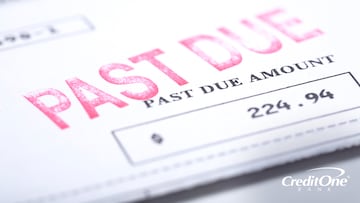7 Reasons to Make at Least the Minimum Payment on Your Credit Card
February 05, 2020
Topics:
Credit Card
There are plenty of articles out there touting why you should pay more than the minimum amount due on your credit card statement each month. And, yes, if you’re trying to pay off a credit card balance as part of a debt-reduction strategy, making more than a minimum payment each month is an important part of such a plan.
But, when money is tight, it may be challenging to come up with even the minimum payment for your credit card, and it could be tempting to skip a payment or pay less than the minimum amount due. Try to resist this temptation.
Failing to make at least the minimum payment due on your credit card account could result in any or all of the following repercussions:
1. You May Incur a Late Fee
A missed payment is obviously late, but did you know that a payment for less than the minimum amount due, even if it’s received on time, is also considered late? Most credit card agreements, or cardholder agreements, specify that payments for less than the minimum amount due are subject to late fees.
To be clear, a late payment should not apply to multiple payments made and received before the due date that add up to at least the minimum amount due for that billing cycle—if your credit card bank allows multiple payments to be made during a billing cycle. So, for example, if the minimum amount due is $25, and you make two separate payments of $12.50 that are both received before the due date, you should not be assessed a late fee. In this example, you paid $25 total, the minimum payment due, on time for the billing cycle.
But, if you were to make a single payment for less the minimum amount due—or multiple payments that don’t add up to at least the minimum—you would likely be assessed a late fee. As of the time of this writing, late fees can range as high as $29 the first time you’re late up to $40 if you were also late in any of the previous six months.
2. You’ll Pay More in Interest
Depending on how much you owe on your credit card, making the minimum payment may not reduce your outstanding balance by much—but it should reduce it by some. How much you end up paying in interest is a function of the interest rate (APR) your credit card charges and the balance you owe. No matter what the interest rate your credit card charges, the lower your outstanding balance on that card, the less you will pay in interest.
3. Your Account May Be Reported as Past Due
A missed payment shouldn’t show up on your credit reports until you’re at least 30 days past due, so if you miss a payment, try to get it in before 30 days have passed from the original due date. Even a single late payment can drop your credit score, as payment history is the most influential factor in determining credit scores.
If you made a payment for less than the minimum, don’t assume that you’re square with your credit card company because they accepted your payment. Credit card companies aren’t in the business of declining payments, so they’re almost always going to accept any amount you pay. But, as previously mentioned, a payment of less than the minimum amount due is likely in violation of the terms of the credit card agreement, so you’ve technically breached the contract by making a payment that’s short.
4. It Could Lower Your Credit Score by Raising Your Credit Utilization
Along with lowering your credit score by potentially showing a late payment for your credit card in your credit reports, not paying at least the minimum amount due could also lower your credit score by affecting your credit utilization ratio, an important mathematical equation used in calculating credit scores.
A lower credit utilization ratio, typically less than 30%, can contribute to a higher credit score. And reducing your outstanding credit card balances is key in lowering your credit utilization ratio.
While making only the minimum payment may not reduce your outstanding balance by much, making no payment—or a payment that’s less than the minimum amount due—contributes to reducing it even less. Your balance may also grow from accruing more interest plus any late fees or other penalties you incur.
5. Next Month’s Minimum Payment Will Be Higher
A missed or short payment doesn’t just go away. It will be tacked on to the minimum amount due on your next statement, plus any fees for missing a payment, creating an even higher minimum amount due on your next statement. And unless your financial circumstances change for the better, if it wasn’t possible to make the minimum payment on the last statement, it’ll likely be even tougher to make it next month.
6. Your Interest Rates May Increase
If you’re enjoying a lower promotional interest rate on the credit card, say, from a balance transfer, you may forfeit that interest rate and be charged a substantially higher rate. This is known as a penalty APR and should be spelled out in the credit card agreement.
Penalty APRs don’t just apply to promotional periods on balance transfers. Your credit card agreement may stipulate that the credit card bank has the right to assess a penalty APR triggered by specific negative behavior, such as allowing the account to reach 60 days past due. That new penalty APR may not just apply to balances going forward, either. Depending on terms spelled out in the agreement, it could retroactively apply to existing balances.
7. You May Forfeit Any Rewards Earned
If you have a credit card that earns you rewards—cash back, airline miles, travel perks, etc.—your rewards program may have a stipulation that you lose some or all of the rewards you’ve earned should you make a late payment. It may not happen after just one late payment, but the details should be spelled out in your credit card agreement under the rewards-program section. Just know that such a stipulation is fairly common, so failing to make the minimum payment could cost you rewards that you spent months, or even years, earning.
With so much at stake from failing to make the minimum payment, what should you do if you absolutely, positively can’t come up with the payment? Perhaps the best thing to do is talk to your credit card bank and make them aware of your situation. They may be willing to waive fees, take partial payments, or work out some other arrangements, especially if you’ve made consistent, on-time payments up until that point. At the very least, they’ll appreciate you communicating with them, and it’s always better to keep the lines of communication open.
In the market for a credit card on which you can make steady, on-time payments and build a positive payment history? See if you Pre-Qualify for a Credit One Bank credit card in less than 60 seconds—without harming your credit score.
After realizing he couldn’t pay back his outrageous film school student loans with rejection notices from Hollywood studios, Sean focused his screenwriting skills on scripting corporate videos. Videos led to marketing communications, which led to articles and, before he knew it, Sean was making a living as a writer. He continues to do so today by leveraging his expertise in credit, financial planning, wealth-building, and living your best life for Credit One Bank.



